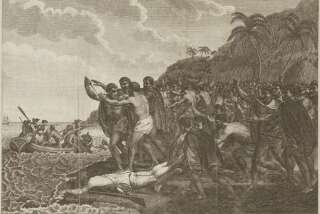Columbus’ Log Reveals Neither a Demigod Nor a Brute
- Share via
Put honest textbooks in the hands of good teachers, and the study of history will enlighten, not frighten.
As a grade school student in the 1950s, I was taught that Christopher Columbus and crew discovered America in 1492. We were told Columbus was a heroic figure, but until recently I couldn’t tell you one other thing about him. What kind of history lesson was that?
In some circles today, people are wringing their hands about what they fear is being done to Columbus’ reputation. Some want to brand him as the forefather of the European invasion that annihilated American Indians and wreaked environmental havoc. The other side insists that Columbus’ stature be upheld as a seminal figure in world history.
The sides will probably square off throughout next year’s 500th anniversary of Columbus’ voyage to the Americas. There may be no stopping them, but I’m taking solace after a conversation I had with Chuck Stanaert of the county’s Department of Education.
“We’re not rewriting history, but we’re taking time to uncover history,” Stanaert said. All the good and bad aspects of the European influence on the Americas will be discussed, including slavery, he said.
Acknowledging that U.S. education has “tended to perpetuate the myth” of Columbus as something approaching a demigod, the new texts will provide a more multicultural, global perspective, Stanaert said.
That is, previous textbooks discussed Columbus “primarily from the idea of European superiority, with a disregard of native cultures,” Stanaert said. “Is Columbus a hero or a villain? The real answer lies somewhere in between. He was representative of a culture and a time, rather than the perpetrator or the originator of some of these ideas.”
Robert Fuson, a retired professor of geography at the University of South Florida and the author of a new translation of Columbus’ daily log on his trip to America, said it’s unfair to portray Columbus as evil.
“My opinion is you can’t build a 1990 agenda on a foundation of 1492,” Fuson said from his home in Temple Terrace, Fla. “We’ve got an accidental discovery by a guy who was going somewhere else and later got caught up in institutions he didn’t create and couldn’t control, like the church and the state. . . . How in the world could you blame him for everything that happened?”
Conceding that he is a geographer and not a social scientist, Fuson said he gets “a little disturbed by this whole notion we have in this country of bashing every hero we have. No one assumes Columbus was a saint. He was a human being, and all of us are flawed. If you start looking at flaws in characters throughout history, you’ve got to throw all of them into the deep blue.”
It isn’t necessary that history beatify Columbus, Fuson said, but it’s wrong to blame him for all subsequent evils. “That’s like saying the Industrial Revolution was evil because it produced child labor and sweatshops. Columbus never started out to discover a new world and then engage in genocide. . . . I would never say everything he did was right, but you have to look at the fact he did this in 1492 and say, ‘What would I have done in 1492, and what would he have done today?’ ”
Fuson’s new translation, published by a division of McGraw-Hill, provides fascinating reading. From an entry dated Oct. 12, 1492, Columbus wrote: “I want the natives to develop a friendly attitude toward us because I know that they are people who can be made free and converted to our Holy Faith more by love than by force. I gave red caps to some and red beads to others. They hung the beads around their necks, along with some other things of slight value that I gave them. And they took great pleasure in this and became so friendly that it was a marvel.”
On Oct. 21, Columbus wrote of sailing around “another great island that I strongly believe should be Japan.”
On the day he left to return home, he left instructions with his men: “They should greatly respect King Guacanagari and his chiefs and principal men. . . . And they should avoid as they would death annoying or tormenting the Indians, bearing in mind how much they owe these people and why it is necessary to keep them content, since they are remaining in Indian land and under Indian dominion.”
I’m not nearly enough of a historian to take sides in the Columbus controversy.
The only side I want to win is this generation of students. I’d rather have them get the full story of Columbus and not a 30-second sound bite.
To that end, I like what Stanaert said when I asked him to envision how the country will remember Columbus during next year’s momentous observance.
“I would hope it would be multicultural,” he said. “Not just a celebration of Columbus, but that moment, in terms of Indian culture as well as European culture.”
“And maybe,” he added, “a moment of silence for all the changes wrought by that moment, both positive and negative.”
More to Read
Sign up for our Book Club newsletter
Get the latest news, events and more from the Los Angeles Times Book Club, and help us get L.A. reading and talking.
You may occasionally receive promotional content from the Los Angeles Times.







